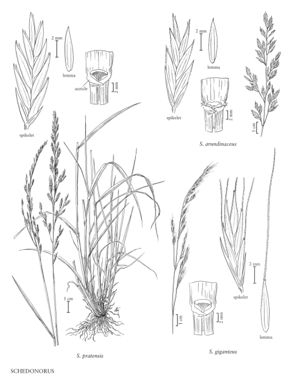Schedonorus pratensis
Plants perennial. Culms to 1.3 m. Leaves folded or convolute in young shoots; auricles glabrous; ligules to 0.5 mm; blades 10-25 cm long, 2-7 mm wide. Panicles (6)10-25 cm; branches at the lowest node 1 or 2, shorter branch with 1-2(3) spikelets, longer branch with 2-6(9) spikelets. Spikelets (8.5) 12-15.5(17) mm long, 2-5 mm wide, with (2)4-10(12) florets. Lower glumes (2)2.6-4.5 mm; upper glumes 3-5 mm; lemmas 5-8 mm, usually smooth, sometimes slightly scabrous distally, apices unawned, sometimes mucronate, mucros to 0.2 mm; paleas slightly shorter than the lemmas; anthers (1.5)2-4.6 mm. Caryopses 3-4 mm long, 1-1.5 mm wide. 2n = 14.
Distribution
Conn., N.J., N.Y., Wash., Ark., Kans., N.Dak., Nebr., Okla., S.Dak., Del., D.C., Wis., W.Va., Mass., Maine, N.H., R.I., Vt., Fla., Wyo., N.Mex., Tex., La., Tenn., N.C., S.C., Pa., Calif., Nev., Va., Colo., Alaska, Ala., Mont., Oreg., Ill., Ga., Ind., Iowa, Ariz., Idaho, Md., Ohio, Alta., B.C., Greenland, Man., N.B., Nfld. and Labr., N.S., Ont., P.E.I., Que., Sask., Yukon, Mo., Minn., Mich., Miss., Utah, Ky.
Discussion
Schedonorus pratensis is a Eurasian species that is now widely established in the Flora region. It used to be a popular forage grass in the contiguous United States and southern Canada, but is now rarely planted.
Selected References
None.
